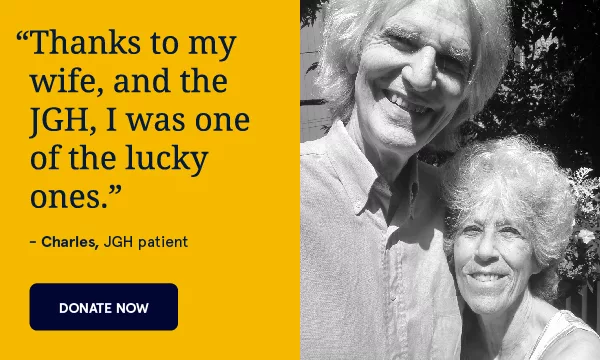
Waking up in the hospital was a disorienting experience for me. I couldn’t remember much – in fact, I recalled almost nothing from a week prior to my hospitalization.
It all started on a typical morning. My wife Dorothy and I got up at 6:30 a.m., drank coffee together, and worked on some sudoku puzzles. Then we exercised and had breakfast. Our plan was to shop at Jean-Talon market with friends and go out for lunch.
As I was getting dressed, my heart stopped. I suffered a cardiac arrest.
Dorothy heard me fall and came running to help. She was terrified when she found me unmoving on the floor and called 911. Responding to the crisis, my courageous 76-year-old wife began to administer CPR. as the 911 dispatcher stayed on the phone. She continued CPR until the first responders arrived. The manual pumping from the CPR forced blood through my veins and ensured my brain got oxygen.
I was brought to the Jewish General Hospital (JGH), where the doctors did an angiogram and put me in a medically induced coma. Since I had been without a heartbeat for 20 minutes, they told Dorothy my chances of neurological recovery were low and not to get her hopes up.
But after four days in the induced coma, I woke up! Thanks to my wife, and my good fortune at being taken to the JGH, I was one of the lucky ones. The survival rate for people suffering out-of-hospital (OOH) cardiac arrest is low, but Dorothy, the first responders and the JGH saved my life.
My patient experience was positive in many ways. The Azrieli Heart Centre’s Cardiovascular Intensive Care Unit is in the new Pavilion K, and the rooms are state-of-the-art. They come with the latest equipment and technologies to ensure patients like me get the best possible care!
For two weeks, I was cared for by exceptional doctors, nurses, nutritionists, physical and occupational therapists, and a social worker. Dorothy and I were amazed and grateful for the kindness, empathy, and knowledge each medical expert displayed.
In the news, you’ll often hear about the failures of our medical system. But on the front lines, thousands of medical personnel go to great lengths to help their patients. That’s what I witnessed in my time at the JGH. Somehow, my stay in the ICU and the Cardiology department felt comforting and positive, even in light of the trauma Dorothy and I had experienced.
Our lives are mostly back to normal. We can do many of the things we did before, but our perspectives have changed. I have learned that while our current system may not be perfect, private donations to the JGH are quickly invested in equipment, technology, staff, and renovations. I saw it myself first-hand.
It’s undeniable – support from donors makes the difference between a GOOD hospital and a GREAT one. Government funding simply is not enough. That’s why, on behalf of my wife and me, I am asking you to please donate to the JGH annual fund.
Thank you for your support. It truly contributes to the exceptional care at the JGH – and makes all the difference to patients like me.
– Charles






